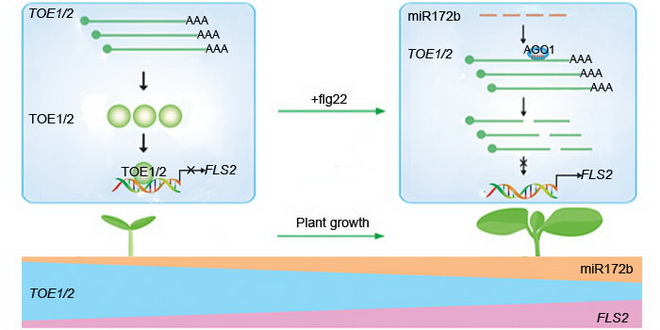- Home >> News&Events >> Events
Transcriptional regulation of the immune receptor controls the ontogeny of plant innate immunity
The human immune system in early life undergoes rapid, radical changes and displays large differences from that of adults. However, whether the plants innate immunity involves an ontogenic process during seedling development remains unknown yet.
A research group led by Dr. Dongping Lu from Center for Agricultural Resources Research, Institute of Genetics and Developmental Biology, Chinese Academy of Sciences, collaborating with Dr. Dingzhong Tang from Fujian Agricultural and Forestry University discovered an underlying mechanism that regulates the ontogeny of plant innate immunity.
They found that the immune responded mediated by the immune receptor FLS2 were gradually enhanced during Arabidopsis seedling development, and this process was controlled by the transcription FLS2. Further studies showed that two AP2 transcription factors, TOE1 and TOE2, could bind directly to the promoter of FLS2 and inhibit its transcription. TOE1 and TOE2 are known to be target genes of the microRNA miR172. This study reported that during seedling development, miR172 abundance increased gradually, and the protein accumulation of TOE1 and TOE2 decreased with time, which resulted in the increased FLS2 expression and, consequently, the ontogeny of plant innate immunity.
The work was published online in The Plant Cell on October 18, 2018 (doi: 10.1105/tpc. 18.00297). Associate professor Yanmin Zou and doctoral graduate student Shuangfeng Wang, all from Dr. Dongping Lu's lab, are the co-first authors of the paper, and Dr. Lu is the corresponding author. The research was supported by the Ministry of Science and Technology, the National Natural Science Foundation of China and the State Key Laboratory of Plant Genomics.

Fig.: Regulation mechanism of plant innate immune system otogeny
